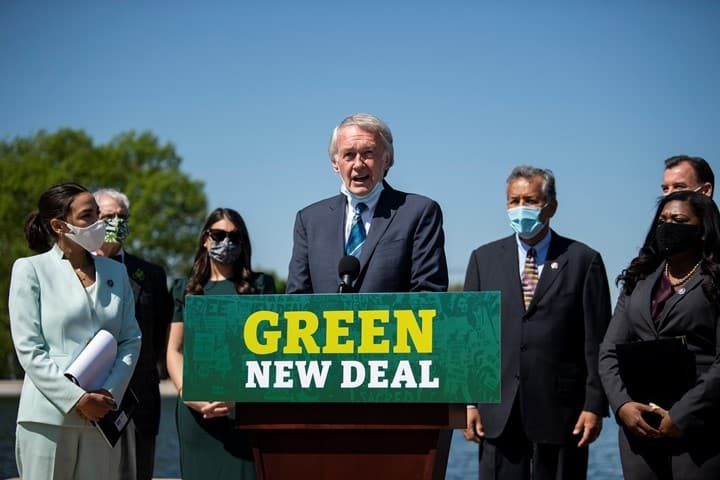
Podcast: Play in new window | Download ()
Subscribe: Android | RSS | More
While a group of senators are attempting to hammer out a bipartisan consensus on a new infrastructure bill, certain Democrats showed on Tuesday that they were unwilling to budge in the slightest on their demands that the so-called “climate crisis” be forcefully addressed in any such legislation.
Senator Ed Markey (D-Mass.), one of the original co-sponsors of the Green New Deal, and Senator Jeff Merkley (D-Oregon) held a joint news conference on Tuesday to address their concerns.
“Our Republican colleagues are running the same playbook against climate action that they did against Waxmen-Markey twelve years ago. Dither, delay, deny,” Markey said. “This time, we are prepared for their attack.”
Waxman-Markey was a reference to the cap and trade system that Markey and California representative Henry Waxman attempted to foist on the American people in 2009. That bill passed the Democrat controlled House at the time but was never brought to the floor of the Senate.
Markey suggested that any attempt at a bipartisan agreement was a fool’s errand, quipping that the GOP was “the gas and oil party.”
“It’s time for us to put on that classic song by Fleetwood Mac, it’s time for us to go our own way,” Markey said. “This is as clear as day. No climate, no deal.”
“We need to move forward with 50 Democratic votes now that the Republicans have shown us they’re not serious about creating clean energy jobs, jump-starting a clean energy revolution or adding the standards and investments we need to attack this crisis,” Markey said.
Markey stressed that the Senate needs to get a climate-friendly infrastructure bill done by the time the Senate breaks for its August recess.
“Let’s get this done for the American people. Let’s get it done before we break for August. Let us put this on the front burner. Let’s get this done because it has to be done, otherwise we will fall into the Republican trap of delay and denial that will ultimately harm and perhaps preclude our ability to act in this very important area.”
Merkley echoed Markey’s concerns that climate change should be the central issue on any new infrastructure plan. Markey said that so-called renewable energy and the development of new technologies need to be on the infrastructure agenda.
“When the ship sails on infrastructure, energy investments cannot be left on the docks,” Merkley said. “If there is no climate, there is no deal.”
Undeterred by Markey’s warning against bipartisanship, a group of ten senators has been working on a less ambitious infrastructure plan than the one President Joe Biden unveiled in January. Originally, that plan was set to cost more than $2 trillion, although Biden later dropped spending to $1.7 trillion. Those senators include Democrats Joe Manchin (West Virginia), Krysten Sinema (Ariz.), Jeanne Shaheen (N.H), Jon Tester (Mont.), and Mark Warner (Va.). GOP senators include Bill Cassidy (Ill.), Susan Collins (Maine), Lisa Murkowski (Alaska), Rob Portman (Ohio), and Mitt Romney (Mich.).
That the bipartisan Senate working group includes Joe Manchin and Krysten Sinema, two centrist Democrats who have already said that they prefer a bipartisan approach to infrastructure, may pose a problem for Markey’s plan for Democrats to “go their own way” on infrastructure. Losing even one of those votes renders Markey’s “go it alone” strategy moot. Not only will Democrats not get the 60 votes needed for the bill to move forward, the loss of Sinema or Manchin would deny Democrats the ability to use the reconciliation maneuver to end debate and pass the bill with Vice President Kamala Harris acting as the tie breaker.
Over in the House of Representatives, the bipartisan Problem Solvers Caucus released their own “Building Bridges” infrastructure plan last week as well. Among the climate-friendly measures in that offering is money for electric cars and buses.
Caucus member Petter Meijer (R-Mich.) warned against an infrastructure plan with measures that aren’t related to actual infrastructure in it.
“To an extent, you can link everything together if you’re creative enough with your rhetoric,” Meijer told Yahoo News. “We will be pouring concrete as part of this infrastructure plan — we should be focused on what that is, and not trying to stretch these definitions past anything a dictionary might even find remotely plausible.”
And that’s really the point of all the Democrat posturing on infrastructure. With its climate-change heavy measures and its insistence that certain social programs are now deemed to be “infrastructure,” Joe Biden’s American Jobs Plan seeks to redefine what infrastructure is instead of rebuilding what we already know to be infrastructure — our highways, bridges, sewer systems, water and electric systems and communication networks.




